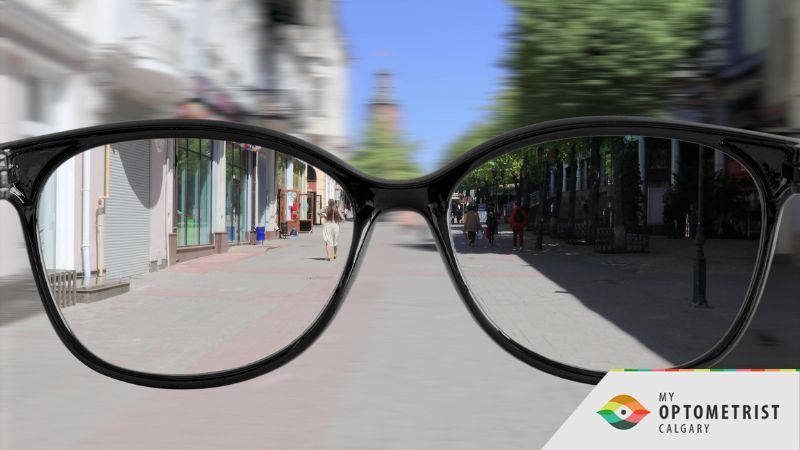
Preventing myopia is essential for maintaining good vision health, especially in Calgary. At My Optometrist Calgary, we recommend five key strategies: increasing outdoor time, limiting screen use, maintaining a balanced diet, scheduling regular eye exams, and using myopia control techniques. Spending more time outdoors exposes eyes to natural light, reducing myopia risk. Limiting screen time and following the 20-20-20 rule helps reduce eye strain. A diet rich in omega-3s and vitamins supports eye health. Regular eye exams ensure early detection and management of myopia. Specialized treatments like Ortho-K lenses and atropine eye drops can effectively control myopia progression. By incorporating these strategies, Calgary residents can maintain clear and healthy vision. Schedule your eye exam today!
Living in Calgary, a city known for its stunning landscapes and active lifestyle, presents unique challenges when it comes to maintaining good eye health. Myopia, or nearsightedness, is a growing concern worldwide and Calgary is no exception. Myopia occurs when the eye grows too long from front to back, causing distant objects to appear blurry. This condition can progress rapidly, especially in children and young adults. At My Optometrist Calgary, we believe in the power of prevention. Here are the top five myopia prevention strategies to help Calgary residents maintain clear vision and prevent the progression of myopia.

Increase Outdoor Time
Spending more time outdoors is one of the most effective ways to prevent myopia, particularly in children. Research has shown that exposure to natural light and engaging in activities that require distance vision can significantly reduce the risk of developing myopia.
Encourage children to spend at least two hours outside each day, whether it's playing sports, hiking, or simply enjoying the park. The bright natural light helps slow down the elongation of the eye, which is a key factor in myopia progression. For adults, incorporating outdoor activities into your routine can also be beneficial. Taking regular walks, biking, or even having your coffee break outside can contribute to better eye health.
Limit Screen Time and Close-Up Work
Excessive screen time and prolonged close-up work are major contributors to the development and progression of myopia. The constant focus on nearby objects can strain the eyes and encourage myopic changes.
Implement the 20-20-20 rule: every 20 minutes, take a 20-second break to look at something 20 feet away. This simple practice helps reduce eye strain and gives your eyes a chance to relax. Encourage children to take regular breaks during homework or screen time. Limiting recreational screen use and promoting activities that involve distance vision can also make a significant difference in preventing myopia.


Maintain a Balanced Diet
A healthy diet rich in essential vitamins and minerals plays a crucial role in maintaining overall eye health and can help in preventing myopia.
Incorporate foods that are high in omega-3 fatty acids, such as fish, walnuts, and flaxseeds, into your diet. These nutrients support retinal health and can help reduce inflammation. Additionally, foods rich in vitamins A, C, and E, such as carrots, citrus fruits, and leafy greens, provide antioxidants that protect the eyes from damage. Ensuring that children have a balanced diet can support their overall growth and eye development.
Regular Eye Exams
Routine eye exams are essential for early detection and management of myopia. Regular check-ups allow optometrists to monitor eye health and make timely interventions.
Schedule annual eye exams for both children and adults to keep track of any changes in vision. Early detection of myopia can lead to effective management strategies, such as prescription glasses, contact lenses, or specialized treatments like orthokeratology (Ortho-K) lenses. These treatments can slow down the progression of myopia and improve overall eye health. Regular eye exams are particularly crucial for children, as their eyes are still developing and changes can occur rapidly.

Use Myopia Control Techniques

There are several specialized techniques and treatments available to control and slow the progression of myopia. These methods are especially effective for children and adolescents.
Discuss with your optometrist the possibility of using multifocal contact lenses, Ortho-K lenses, or atropine eye drops. Multifocal lenses help by providing clear vision at all distances and can reduce the strain on the eyes. Ortho-K lenses are worn overnight to reshape the cornea temporarily, providing clear vision during the day without the need for glasses or contact lenses. Atropine eye drops have been shown to slow myopia progression significantly. Your optometrist can recommend the best myopia control strategy based on your individual needs and lifestyle.
Preventing myopia requires a proactive approach and a combination of strategies. Increasing outdoor time, limiting screen use, maintaining a balanced diet, scheduling regular eye exams, and exploring myopia control techniques can all contribute to better eye health and clear vision. At My Optometrist Calgary, we are committed to helping you and your family maintain optimal eye health through personalized care and preventive measures. By incorporating these myopia prevention strategies into your daily routine, you can help protect your vision and enjoy all that Calgary has to offer with clear and healthy eyes. Schedule your routine eye exam today and take the first step towards a brighter, clearer future.
FAQs
Q: How does spending time outdoors help prevent myopia?
A: Spending time outdoors exposes the eyes to natural light, which helps slow down the elongation of the eye, reducing the risk of developing myopia.
Q: What is the 20-20-20 rule?
A: The 20-20-20 rule suggests that every 20 minutes, you should take a 20-second break to look at something 20 feet away. This helps reduce eye strain from close-up work and screen time.
Q: How often should children have eye exams to monitor for myopia?
A: Children should have eye exams at least once a year to monitor vision changes and detect myopia early, allowing for timely intervention and treatment. Contact us if you have any questions!